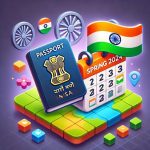Getting an F1 Visa: A Complete Guide For overseas students hoping to study in the US, the F1 visa is an essential first step. Anyone hoping to follow their academic goals in this diverse and opportunity-rich environment must comprehend the complexities of the F1 visa application process. The F1 visa was created especially for students attending a university who are enrolled in academic or English language programs. S.
an organization. The non-immigrant visa permits students to stay in the United States. S. throughout their academic career, with the option to stay longer for opportunities for hands-on training after graduation.
But the process of getting an F1 visa can be difficult, involving a number of steps that must be carefully followed, such as application processes, interviews, and documentation. Prospective students must first obtain admission to an institution approved by the Student and Exchange Visitor Program (SEVP) in order to start this journey. Form I-20, a crucial document that details the program and verifies the student’s eligibility for the F1 visa, is given to students upon acceptance.
Remember that the F1 visa application process is more than just a formality; it entails a careful assessment of the applicant’s goals, financial security, and academic preparedness. A student’s chances of getting their visa and starting their studies in the United States can be greatly increased by being aware of these subtleties. S. . When it comes to getting an F1 visa, preparation is essential. Although the application process can vary greatly depending on each case, it is generally advised to start the process as soon as possible, ideally a few months prior to the academic program’s scheduled start date.
Students should become familiar with important dates, such as the dates on which they must submit applications to the universities of their choice and the schedule for setting up interviews for visas. There are numerous enrollment deadlines that students must meet, & failing to do so may make it more difficult for them to continue their education in the United States. S. Students must take into account the processing times for visa applications in addition to the deadlines set by the institution.
The U. S. It is advised by the Department of State that candidates submit their F1 visa applications at least three months before the date of their intended trip. This provides enough time for processing and any unforeseen delays. Students should also understand the conditions necessary to keep their Formula One status after they get to the United States. S. .
including adherence to work restrictions and full-time enrollment. Through preparation and organization, students can more easily and confidently handle the intricacies of the F1 visa application process. Recognizing the Value of F1 Visa Interview Schedules. Setting up an interview for an F1 visa is a crucial part of the application procedure.
Longer wait times may result from changes in the demand for visa appointments caused by seasonal patterns and geopolitical events, among other factors. Students must therefore take immediate action after receiving their Form I-20 from their educational institution. interviewing for an F1 visa. A majority of U. S.
As soon as they are qualified, students should utilize the online interview scheduling feature offered by embassies and consulates. Candidates should be ready to divulge personal information during an interview, such as their passport information and SEVIS ID number from their Form I-20. Prerequisites and Protocols for the Interview. Examining the particular guidelines and protocols of the U.S. A.
The location of the embassy or consulate where they intend to apply may differ. Before their interview is scheduled, students may occasionally be required to pay a visa application fee. lessening the strain during the application process.
Students can reduce some of the stress related to the F1 visa application process by being proactive and organized in securing an interview appointment. The F1 visa interview is a crucial meeting that determines whether an applicant will be granted a visa, so preparation is essential. To start, students should go over all of their application materials, including their Form I-20 and any other supporting documents they intend to bring to the interview. Accurate & concise responses to questions can be provided by applicants who are familiar with these documents, which will also increase their confidence. Students should prepare for typical interview questions that consular officials might ask in addition to going over documentation.
These inquiries frequently center on the candidate’s financial status, academic objectives, and national ties. It is imperative that candidates clearly and persuasively state their goals, indicating their dedication to their studies as well as their intention to return home once their education is over. Candidates can improve their answers & lessen their nervousness on the day of the interview by rehearsing their responses with friends or family.
Having the right paperwork and proving your financial stability are essential for an F1 visa application to be approved. A valid passport, a completed DS-160 form (the online nonimmigrant visa application), a Form I-20 from their educational institution, and a receipt for the visa application fee payment are among the important documents that applicants must bring to their interview. Also, students might be asked to present evidence of their English language proficiency in the form of results from standardized tests or other sources. Financial records are especially crucial for proving that applicants have enough money to pay for living expenses and tuition while they are studying in the United States. S.
Bank statements, scholarship letters, or affidavits of support from sponsors or family members are a few examples of this. Consular officials are prepared to determine whether candidates can support themselves financially while pursuing their education without turning to illegal work. Presenting precise & thorough financial documentation is therefore necessary to prove one’s eligibility for the F1 visa. It can be difficult to navigate the F1 visa application process, but there are a few tactics that can increase an applicant’s chances of success. Above all, applicants must pay close attention to detail; they must make sure that all forms are filled out correctly and sent in on time.
The visa application may be delayed or even denied if there are any inconsistencies or mistakes. Also, staying in constant contact with their institution’s designated school official (DSO) can offer helpful direction at every stage of the procedure. A powerful narrative regarding one’s academic objectives & future plans is another crucial piece of advice. In addition to an applicant’s immediate goals, consular officials are also curious about how they plan to study in the United States.
S. meets their long-term professional goals. In order to make a strong argument for their F1 visa, applicants should clearly state how their education will benefit both them & their nation of origin.
In the end, having confidence and being well-prepared can greatly impact the likelihood of success. keeping up to date & being proactive. It is crucial to maintain composure and take the initiative to find answers in these situations.
Regularly checking the U is one useful tactic. A. Visit the website of the embassy or consulate for information on processing times & appointment availability.
In order to help applicants determine when they might be able to get an appointment, many embassies furnish real-time information regarding wait times for visa interviews. Asking for help and support. It may be helpful to get in touch with the embassy or consulate directly if there are ongoing delays or if an applicant has trouble setting up an interview. There are dedicated contact points for visa inquiries at many embassies where applicants can get help or clarification on their circumstances.
Also, maintaining relationships with classmates who are facing comparable difficulties can offer insightful advice and consolation during this trying time. Getting past challenges and succeeding. Applicants can more effectively handle any challenges that may come up during the F1 visa application process by staying informed & proactive.
In summary, getting an F1 visa necessitates meticulous preparation, careful planning, and a proactive attitude toward overcoming any obstacles. Through comprehension of every stage of the procedure, from gaining admission to getting ready for interviews, international students can improve their chances of obtaining this crucial visa & starting their academic journey in the United States. Aspiring students can realize their goals and add to the diverse cultural fabric that characterizes American higher education if they are persistent and diligent.





